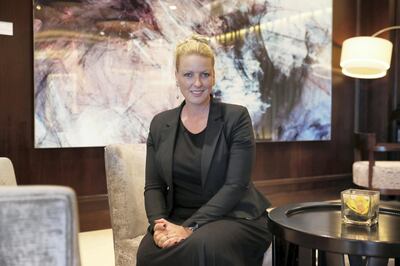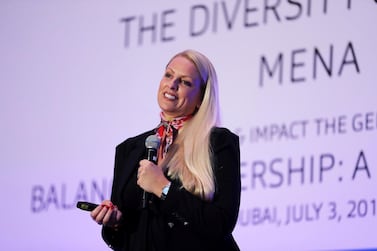Tine Willumsen, the chief executive of the consultancy Above & Beyond Group in Copenhagen and founder of the Danish Diversity Council, says she had “an epiphany” when she was invited to the Top CEO conference last year in Saudi Arabia.
“I was really quite amazed how much focus there was on the growth potential of having more gender diversity in companies and it came up again and again in conversations,” says Ms Willumsen, who started the Diversity Council in Denmark in 2016 with the goal of advancing more women into leadership roles.
She decided to set up the Diversity Council Mena, announcing the decision at this year's Top CEO conference in Bahrain in April and holding the first meeting on July 3 with founding companies that included Accenture, DP World, Bahrain's GFH Financial Group and the Saudi Industrial Development Fund.
“I could see how much it could benefit the region but I could also see that potentially they were even more focused on the issue at hand because it was a real business problem in terms of talent and so on, compared to even Scandinavia,” says Ms Willumsen.
“I realised that, in a way, trying to sell gender equality in Scandinavia is like selling sand in Sahara. People want to advance, they want to do better but we do have about 70 per cent of our women in the workforce.”
Although women represent 49 per cent of the population in the Mena region, they only make up 20 per cent of the workforce. That number is higher in the GCC with the UAE at 51 per cent but Saudi Arabia is at the lower end of the spectrum at 23 per cent, according to World Bank data.
PwC’s Women in Work Index 2019 survey estimates that $575 billion (Dh2.11 trillion) is lost yearly by Mena “due to legal and social barriers that exist for women’s access to jobs”. The report concluded “boosting the number of women in work is not just a moral imperative but also has a measurable impact on the bottom line”.
But change is on the horizon. Several government initiatives in the region have set gender equality targets. The UAE, currently in 46th place in the United Nations Development Programme’s Gender Inequality Index, aims to be one of the world’s top 25 countries for gender equality through its Vision 2021. The UAE cabinet approved a law last year ensuring men and women receive equal pay.
The Saudi government has set a target to increase female participation in the workforce to 30 per cent as part of Vision 2030. The percentage of women working in the country increased from 14.5 per cent in 1990 to 23.3 per cent last year.
In comparison, Nordic countries have high percentages of women in the workplace, with Denmark at 58 per cent and Iceland at 72 per cent. Denmark, Sweden and Norway are among the top five countries for gender equality in the UNDP’s index.
More significantly, such countries have much higher percentages of women in leadership positions than the Mena region. Women only represent 4.8 per cent of the total voting board seats of the largest 142 public companies in Mena, according to a recent OECD report. Approximately 30 per cent of companies had at least one women board member, 24.6 per cent had at least two and only 7 per cent had three or more woman board members.
Ms Willumsen, who is also the author of the 2018 book Womenomics: Gender Diversity and the Rise of Female-Driven Growth Potential, estimates that large companies in the region have around 10 per cent women in leadership roles. In Scandinavia, she says, that figure is approximately 20 to 25 per cent.
“So to reach things like the [Saudi] Vision 2030, there needs to be an accelerator to get from A to B,” says Ms Willumsen. “The willingness is there and it’s also important to tell the region that other parts of the world have not achieved [gender equality] yet either. There’s a long way to go.”
This is where the Diversity Council comes in. In Denmark, its members include PwC, McKinsey, Microsoft, container shipping giant Maersk, the Central Bank of Denmark and the Danish Foreign Ministry. They hold two chief executive meetings and two human resources workshops annually to discuss challenges and initiatives around gender diversity.
In addition, the council runs three leadership programmes for women, including a one-week fast-track programme for emerging female managers, a six-month global leadership programme and a one-year advanced leadership programme.
The courses, facilitated by Headspring Executive Development, are taught by professors from London Business School, Insead, IE Business School in Madrid and the University of Cambridge; as well as leadership experts from McKinsey and senior business journalists from the Financial Times.
Out of the Danish Diversity Council’s first graduating class of the one-year programme in 2017, 43 per cent were promoted in their companies. The second graduating class, last year, saw 38 per cent promoted.
“It’s not just about adding new skills — because these women are highly educated — but getting them through to the top leadership level is what will provide companies new decision-making and new innovative ideas,” says Ms Willumsen.
The Diversity Council also seeks to encourage more women to study in STEM (science, technology, engineering and maths) fields. According to a 2017 BCG report on universities being key to unlocking diversity in Denmark, around 60 per cent of the country’s leaders graduated with master’s degrees in either economics and business administration, economics or engineering.
“Yet, on those lines of education, where 60 per cent of the leaders minimum come from, we have only 30 per cent women studying,” Ms Willumsen says, citing figures from the Danish Education and Research Ministry. The council, therefore, reached out to its members to put forward female leaders from a STEM background in a campaign called “Lead the Future”.

Ms Willumsen hopes to bring the same value to the region through the Diversity Council Mena, which will offer the same structure and programmes as in Denmark.
“More than half of the educated university students coming out here in this region are women and it’s a waste of social and economic resources if these well-educated women are not actually being able to apply themselves,” she says.
Increasing the maternity retention rate is one example of the challenges faced by companies globally and discussed by the council. A study by consultancy KPMG, commissioned by the Maersk Group, found that between 2012 and 2014 the group lost 30 per cent of women following childbirth across 76 countries. Following the study, Maersk introduced a new maternity policy guaranteeing a minimum of 18 weeks’ maternity leave in at least 51 countries out of the 130 in which the group operates.
“If a woman chooses to be with her family, it’s absolutely OK and many, many do also in Europe and Scandinavia, but once you actually are well educated, you’re highly competent, a lot of women we see are beginning to open their own companies,” says Ms Willumsen. “And these women should actually be the skills and talent you should get into your big corporations.”
Research shows that bringing more women into leadership roles also boosts profits and performance. A 2018 McKinsey report found that companies with the most gender-diverse management teams were 27 per cent more likely to achieve above-average profit margins.
“Very often, diversity and inclusion is taken as a social issue, but … it’s a business issue and therefore it actually takes a business solution,” says Ms Willumsen.










